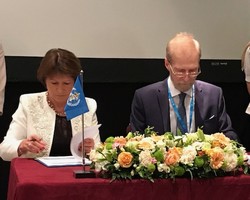Major step towards control of noncommunicable diseases in the WHO European Region

WHO
Dr Piroska Ӧstlin, Acting WHO Regional Director for Europe, and Mr Dmitry Kostennikov, Deputy Minister of Health of the Russian Federation, signed the Donor Agreement between WHO/Europe and the Russian Federation. The Agreement sets out the Russian Federation’s financial contribution for continued joint work to fight noncommunicable diseases (NCDs) in the Region.
Signed on 3 July 2019 in Moscow, the grant marks a milestone in the Region’s response to its high burden of NCDs. Taken together, the major NCDs – diabetes, cardiovascular diseases, cancer, chronic respiratory diseases and mental disorders – account for more than 80% of the deaths and over two thirds of the disease burden in the Region.
More than 100 Russian and international experts witnessed the signing ceremony, part of a 2-day meeting on innovative approaches to counteract NCDs. During the meeting, Russian experts and representatives of centres of excellence showcased best practices in the fight against NCDs.
“With the signature of the new grant, we rise to new challenges in the NCD response in the Region,” said Dr Ӧstlin. “This support from the Russian Federation opens new avenues in confronting the NCD epidemic, and at the same time it challenges us to undertake more cutting-edge initiatives and intersectoral efforts.”
Concerned by the growing number of deaths and disabilities caused by NCDs, the Russian Federation and WHO/Europe teamed up in 2014 to establish the WHO European Office for the Prevention and Control of Noncommunicable Diseases (NCD Office) a powerhouse of innovation to counteract NCDs. The NCD Office forms an integral part of WHO/Europe’s Division of Noncommunicable Diseases and Promoting Health through the Life-course, and makes WHO support available to multiple countries in the Region.
“The Russian Federation has been a global leader in the prevention and control of NCDs for many years,” pointed out Mr Kostennikov. “A new grant showcases that the Russian Government commits to continue and accelerate actions to halt the spread of NCDs in the Region and globally in collaboration with WHO.”



